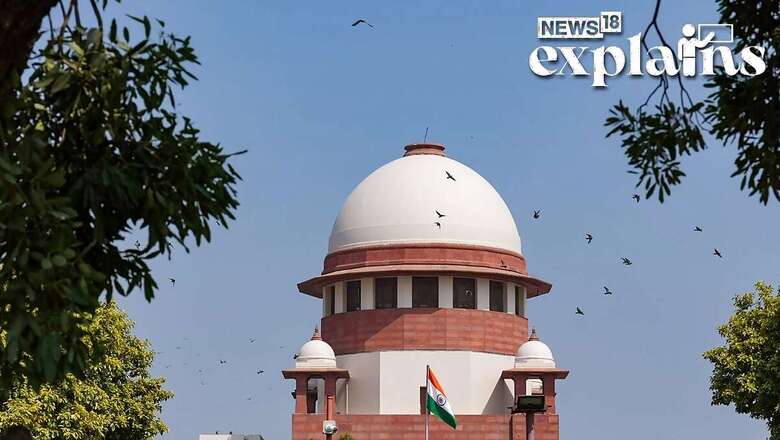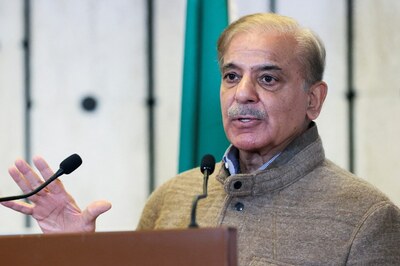
views
The Supreme Court of India is hearing an appeal against it 1998 judgement that provided immunity to the Members of Parliament and Legislative Assemblies (MPs & MLAs) under Articles 105(2) and 194(2) of the constitution.
A seven-judge constitution bench including Chief Justice of India DY Chandrachud, Justice A S Bopanna, Justice M M Sundresh, Justice Pamidighantam Sri Narasimha, Justice JB Pardiwala, Justice Sanjay Kumar and Justice Manoj Misra will revisit the ruling to see whether the shield is available to those taking bribe to make a speech or vote in Parliament and State Legislatures.
In the 25-year-old judgment, the five-judge bench of the apex court in PV Narasimha Rao vs State by a majority of 3:2 held that members of the parliament or state legislatures were immune from prosecution in bribery cases revolving around any speech or vote in the house, as they have parliamentary privilege conferred by Articles 105(2) and 194(2) of the Constitution.
As the apex court decides upon the validity of immunity ensured by its previous judgment, let us take a look at the different privileges that members of Parliament and Legislative Assemblies enjoy.
What are Parliamentary privileges?
Parliamentary privileges can be divided into two broad categories: (1) Collective Privileges and (2) Individual Privileges. The Individual Privileges refers to the privileges enjoyed by the members individually while the Collective Privileges refer to those which are enjoyed by the house as a collective body.
Protection from Court Proceedings: The Article 105(2) of the Indian Constitution states, “No member of Parliament shall be liable to any proceedings in any court in respect of anything said or any vote given by him in Parliament or any committee thereof, and no person shall be so liable in respect of the publication by or under the authority of either House of Parliament of any report, paper, votes or proceedings.”
Protection Against Anything Said or Voted: According to the Article 194(2) of the Constitution, no member of the Legislature of a State shall be liable to any proceedings in any court in respect of anything said or any vote given by him in the Legislature or any committee thereof, and no person shall be so liable in respect of the publication by or under the authority of a House of such a Legislature of any report, paper, votes or proceedings.
Freedom from Arrest
Section 135A of the Code of Civil Procedure, 1908 exempts a member legislative body from arrest and detention under civil process.
The Article states that no person shall be liable to arrest or detention in prison under civil process:
- If he is a member of — (i) either House of Parliament, or (ii) the Legislative Assembly or Legislative Council of a State, or (iii) a Legislative Assembly of a Union territory, during the continuance of any meeting of such House of Parliament or, as the case may be, of the Legislative Assembly or the Legislative Council.
- If he is a member of any committee of— (i) either House of Parliament, or (ii) the Legislative Assembly of a State or Union territory, or (iii) the Legislative Council of a State, during the continuance of any meeting of such committee.
- If he is a member of— (i) either House of Parliament, or (ii) a Legislative Assembly or Legislative Council of a State having both such Houses, during the continuance of a joint sitting, meeting, conference or joint committee of the Houses of Parliament or, Houses of the State Legislature, as the case may be, and during the forty days before and after such meeting, sitting or conference.
Freedom from Attendance as Witness
Another privilege that the legislators enjoy is ‘Freedom from Attendance as Witness’. DD Basu in his book ‘Introduction to the Constitution of India’ writes that “a member cannot be summoned, without the leave of the house, to give evidence as a witness while the Parliament is in session.”
Article 105 of the Indian Constitution is an important article that mentions the privilege conferred to the members of Parliament or the State Legislatures.
- As per the article, the members shall have the freedom of speech in the Parliament.
- No member of Parliament shall be liable to any proceedings in any court in respect of anything said or any vote given by him in Parliament or any committee thereof, and no person shall be so liable in respect of the publication by or under the authority of either House of Parliament of any report, paper, votes or proceedings.
- In other respects, the powers, privileges and immunities of each House of Parliament, and of the members and the committees of each House, shall be such as may from time to time be defined by Parliament by law, and, until so defined, shall be those of that House and of its members and committees immediately before the coming into force of section 15 of the Constitution (Forty-fourth Amendment) Act,1978.
- The provisions of clauses (1), (2) and (3) shall apply in relation to persons who by virtue of this Constitution have the right to speak in, and otherwise to take part in the proceedings of, a House of Parliament or any committee thereof as they apply in relation to members of Parliament.
It means that the Constitution of India has extended these privileges to those persons who are entitled to speak and take part in the proceedings of a House of Parliament or any of its committees. These include the Attorney General and Union Ministers.
M Laxmikant in his book ‘Indian Polity’ writes that Parliament till now has not made any special law to exhaustively codify all the privileges. They are based on five sources that include (1) Constitutional provisions (2) Various laws made by the Parliament (3) Rules of both the houses (4) Parliamentary conventions (5) Judicial interpretations.
As the apex court has reserved its judgement in the appeal against its 1998 verdict, it has to be seen what shape the privileges guaranteed to the members of Parliament and state legislatures will take.



















Comments
0 comment